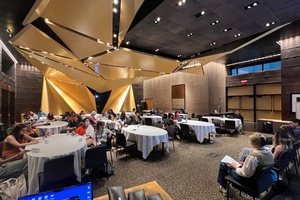Features:
Sincerely, Leaders of Color: Leaders, you need to make room or move out
Going beyond a seat at the table for journalists of color

(Photo by Michael Fousert on Unsplash)
About this series: Sincerely, Leaders of Color is written for everyone in the journalism industry who cares about creating a more supportive environment for journalists of color to do their best work. Have a question for the team? Drop it here and watch for it in a future column. This column is proudly sponsored by the Executive Program and the Tow Knight Center at the Craig Newmark Graduate School of Journalism at CUNY, and our guest writers budget is sponsored by The American Press Institute.
To Leadership,
We’ve all heard the saying, “own a seat at the table.” It’s incredible advice for a new manager trying to find their space, especially if they suffer from imposter syndrome.
That advice reminds us we’ve worked hard to get into the room – and with help from mentors and, dare I say, our ancestors – we need to summon the courage to take that seat with confidence.
There are two things I’d like to add to that saying.
For managers who have successfully established ownership of that seat and have influence over that table: make room.
So many managers rightfully take up space but, over time, lose track of how much space they are taking.
Too many managers begin to cling on to that ownership and space so that they can shine rather than seeing it as an opportunity to equip others.
That clinging comes from insecurity, the fear of change and individual growth.
Those managers tend to feel threatened by their talented team, worried that those talented team members may outshine them, replace them or get hired away.
We have all had these bosses. They lead to low morale, burnout and talent fleeing the company.
The direct report leaves, spills the tea during their exit interview and nothing happens. The manager is still there desperately trying to keep control over their fiefdom to the detriment of the team and the organization.
To those leaders: Insecurity – especially in these stressful, constantly changing times – is natural. What is your role going to be if you don’t own the room and how will you continue to fit into these evolving spaces?
That discomfort is understandable, but just like your direct reports that need space to grow, so do you.
Make room.
This can take many forms, not only within your department or organization, but also in our industry.
If you are a good manager who has hired well, you should have faith in your team to do their jobs.
You don’t need to be a micromanager, which takes away your employees’ confidence and abilities to do their jobs.
Give them space in team meetings and praise their work – even if it didn’t go to plan, but they made a great effort – publicly so the company can celebrate them and privately, if that is what they prefer (ask them). This small act goes a long way in this underpaid, overworked reality.
But I want you to do more than small acts.
When I first became a manager, my boss told me: “It’s no longer about your wins, it is about theirs.” Among the many responsibilities on a manager’s list is creating a space to elevate your team.
Make time to submit their work for industry recognition. Yes awards – a metric the traditional guard still values – proves to the company the work they have produced is admired outside of the organization.
Have them attend industry conferences – better yet, help them submit a panel talk or workshop that literally gives them a stage to shine and show off their work.
But… what if… someone… wants to.. hire them away? I can hear you asking that.
If you are a good manager that genuinely cares about your direct report, you know what the right answer is: don’t try to hold them back, let them grow.
(Truth is, if you create this open and collaborative atmosphere, members of your team are going to be reluctant to leave a great environment.)
Another way they can have their profile elevated is serving on a national industry board. I’ve had the privilege to serve on the boards of the National Association of Hispanic Journalists, the Online News Association, Chicas Poderosas, InquireFirst and others.
I’ve done this only with the support of my boss and employer who sees the value – the return on investment – of me shaping the industry and extending our reputation and brand.
As a direct report and as a manager, I have been fortunate in my career to have these types of opportunities, which also include being invited to write industry pieces as well as organize several national industry conferences.
As proof that I practice what I preach, within these opportunities, I have tried to make room.
For example, I proactively recruited and mentored other journalists to replace me as NAHJ’s national conference organizer. Or encouraged and guided other journalists to take the lead for an unconference conference I was involved with. While they were nervous and hesitant to start, the opportunity helped them thrive and cement them as leaders.
Earlier this year I was invited to write a Nieman Lab Pprediction and converted the opportunity into a high-profile platform for my students as they prepare to graduate and look for jobs.
There are countless ways to make room and go from a good boss to a great boss.
The second addition to that saying is:
Move on.
At some point it’s time for you to give up your seat at the table and move on. It’s a reality that many people don’t want to face, but if they don’t it causes more harm than one would think.
Leaving that seat doesn’t mean you don’t have something to offer. It just means you have outgrown that seat and are ready to join another table.
A “traditional” career path in journalism is often reporter to editor or anchor to… well, the unspoken reality is that there are a lot fewer options as someone moves up, so there is hesitancy to continue down that path. Most newsrooms only have one editor-in-chief and if you’re waiting for that person to move on but they never do, how will you be able to move on to whatever is next? (And, honestly, many of us don’t want the top position and all the drama that comes with it.)
But leaders, you still have to evolve and continue on your path.
Perhaps it means taking on a different beat/desk or moving into a different medium. Maybe it is moving to another organization – bigger or smaller with more local impact.
Maybe it is time to take a break and reassess what is next and a fellowship, like the John S. Knight Journalism Fellowships at Stanford, the Reynolds Journalism Institute fellowships, or many others.
Maybe it is moving into the classroom and becoming a professor or moving into another field that would benefit from your experience. Or maybe it’s time to retire and enjoy a new stage of life.
Look, it gets lonelier and lonelier as you climb that ladder, so it is understandable some of us may not want to move on.
So, perhaps think of this as move along… continue the journey on your own path, but continue mentoring and supporting those who will have the privilege to learn how you managed your old seat at the table.
Outgrow the seat, don’t outgrow your welcome.
Empower your team. Help them grow. And have the courage to grow by making room or stepping aside.
Sincerely,
Robert Hernandez
USC Annenberg / JOVRNALISM
This is a guest column, solicited by P. Kim Bui and Emma Carew Grovum and edited by Kim. We want to make sure to include voices from all sorts of backgrounds and experiences. If you’re interested in guest writing, or have someone you’d love to hear from, let us know here.
Credits
-
 Robert Hernandez
Robert Hernandez
Robert Hernandez, aka WebJournalist, has made a name for himself as a journalist of the Web, not just on the Web. His primary focus is exploring and developing the intersection of technology and journalism – to empower people, inform reporting and storytelling, engage community, improve distribution, and, whenever possible, enhance revenue. He is a Professor of Professional Practice at USC Annenberg, but he’s not an academic… he’s more of a “hackademic” that specializes in “MacGyvering” digital journalism through emerging technologies. His most recent work includes Augmented Reality, Wearables/Google Glass and Virtual Reality — he and his students produce VR experiences under their brand: JOVRNALISM™. Their work has won awards from The Webby Awards, The Shorty Awards, the Online News Association, Society of Professional Journalists, among others, and can be seen in Al Jazeera, The New York Times, NBC, NPR, ProPublica, USA Today, and in their own iOS/Android app. He has worked for seattletimes.com, SFGate.com, eXaminer.com, La Prensa Gráfica, among others. Hernandez is also the co-founder of #wjchat and co-creator of the Diversify Journalism Project. He has served on boards that have included Chicas Poderosas, InquireFirst, the Online News Association, and the National Association of Hispanic Journalists (where he is a lifetime member). He is also a Journalism 360 ambassador and program lead. He is the recipient of SPJ’s 2015 Distinguished Teaching in Journalism Award and the 2018 NAHJ Si Se Puede Award. He has made it to imgur’s front page more than once. He connects dots and people.



